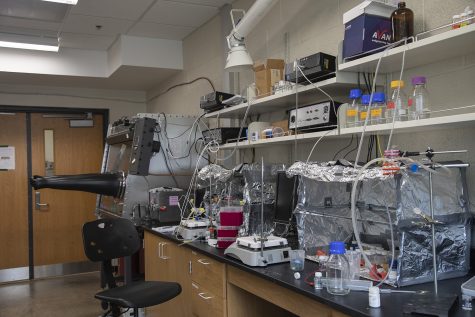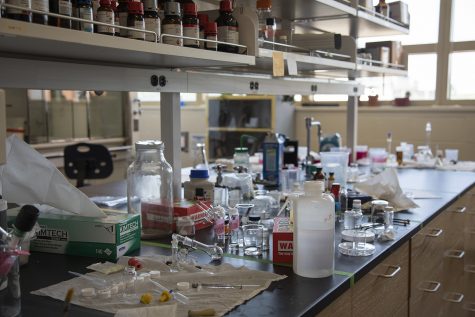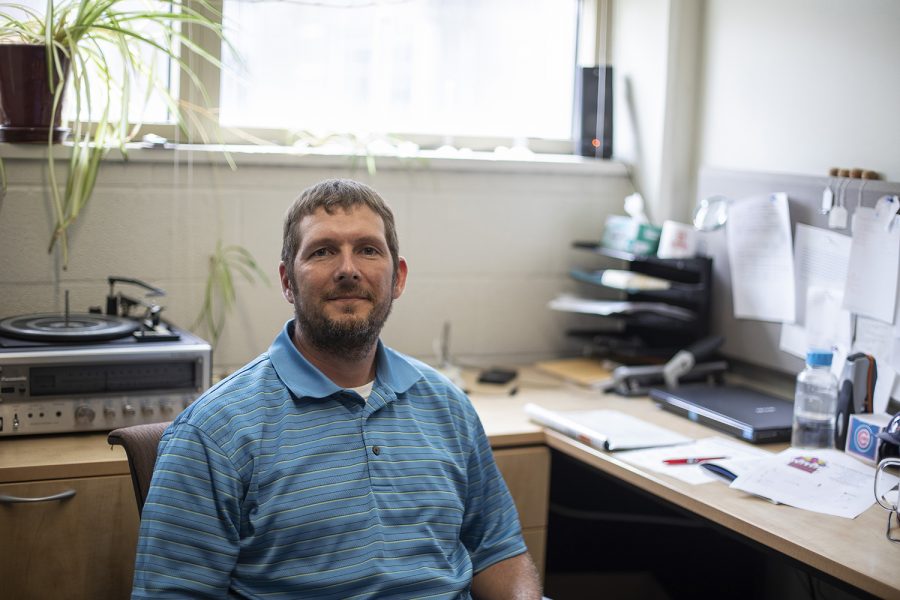UI faculty support first-year rural students with research program
First-year rural students learn how to conduct research through the UI Rural Scholars Program.
UI Chemistry associate professor, Scott Shaw poses for a portrait in his office in Chemistry Building on July 18, 2019. Shaw created the Rural Scholar Program for select incoming students in 2015. (Tian Liu/The Daily Iowan)
July 24, 2019
Four years ago, through collecting data from the Office of Admissions and the University of Iowa Honors Program, UI chemistry Associate Professor Scott Shaw found that significantly fewer small-town and rural students joined research groups from 2012-14.
His statistics demonstrated that while 54.9 percent of science majors were small-town and rural students, 35.4 percent of students doing research were from those areas.
Being someone from a rural area, Shaw said, spurred him to provide opportunities to students that he might not have had when he was younger.
Beginning in 2015, with the help of the Admissions Office, he started reaching out to incoming students from rural areas every year and inviting them to join the Rural Scholar Program.
“[I invited them] to join my research group for a year as real scholars to do research with me,” Shaw said.

Lab equipments are seen at Scott Shaw’s lab in the Chemistry Building on July 18, 2019. Shaw is an associate professor of chemistry at the UI, who created the Rural Scholar Program for select incoming students in 2015. (Tian Liu/The Daily Iowan)
Evangeline Holyoake, a UI sophomore from Decorah who majors in computer science, participated in the Rural Scholar Program last school year.
“Before coming to the University of Iowa as a student, I was not sure I wanted to do … I’m interested in the environment, but I wasn’t sure whether I was able to do anything with that,” Holyoake said. “[The lab] not only showed me how to really work in the lab but also showed me what I want to do, what I am interested in, and a whole perception of what I’m going to do in the future.”
The yearlong program starts with basic instruction on what research is. Every week, students read research papers and meet with Shaw to discuss them, he said. Then, in the second semester, the students use the skills they have learned to begin their own research.
“After the first year is over, I got invited back to continue research in the lab,” Holyoake said. “I’m currently in for the summer, and I will stay here … next year, too.”
RELATED: Research shows college students may be uninformed about their majors
UI junior Catia Atienza of Maquoketa, who majors in interdepartmental studies and is on the pre-dental track, relished the program.
“I’m really thankful I did participate in [the research program], because it is taught me about research …” she said. “It also made me more comfortable about my other science classes as well.”
After participating in the program, students can see what happens in the lab and understand the structure of how research happens, so they know how to get into that system, Shaw said. He believes students can benefit from the experience, especially if they want to go to professional schools.

Lab equipment tools are seen at Scott Shaw’s lab in the Chemistry Building on July 18, 2019. Shaw is an associate professor of chemistry at the UI, who created the Rural Scholar Program for select incoming students in 2015. (Tian Liu/The Daily Iowan)
For now, the program is funded by the Research Corporation for Scientific Advancement through the Cottrell Scholar Award Shaw received in 2016, he said. The $100,000 research and teaching award that funded it for three years will run out this year.
“It’s the last year I have money to do it. I might find funding to continue it. It’s not really expensive, so I will find a way,” Shaw said. “To support the program, it requires a few thousand dollars each year.”
He said the biggest expense is time; it takes him a few hours a week to manage the program. But he really likes doing it and would like to expand the program. One of the issues is he can only accommodate three to five students a year.
“I’m hoping sometime next year actually starting to teach a class, a class that can accommodate 30 students at a time and goes through the basics,” Shaw said.



